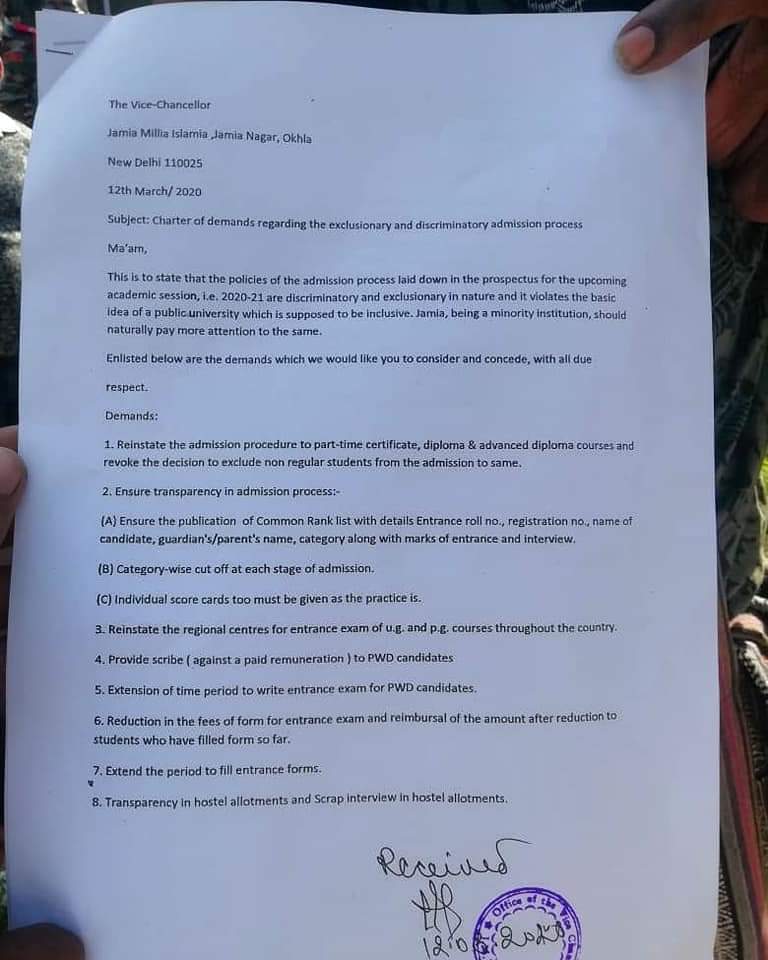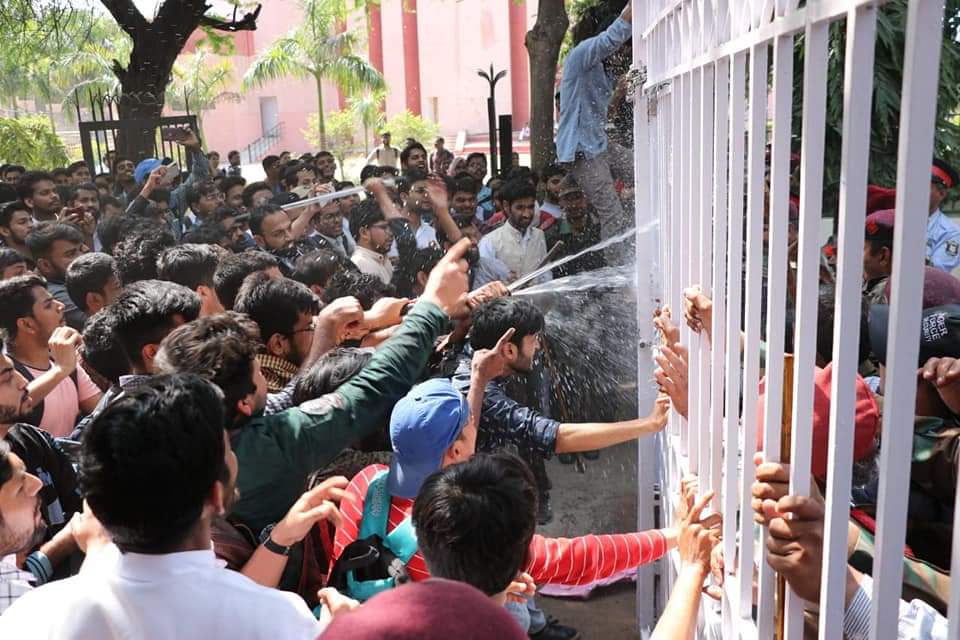The COVID-19 pandemic provided university administrations across the country and the Centre the perfect guise to push anti-student and undemocratic policies in campuses, and to suppress voices of dissent in these spaces. A case in point is Jamia Millia Islamia.
The university, together with the adjoining area of Shaheen Bagh, became the epicentre of the movement against the contentious Citizenship Amendment Act (CAA), and successfully led a sit-in protest against the law for more than a hundred days. In the interest of public health and safety, the protestors suspended the sit-in on March 24, 2020.
Perhaps curbing dissent is classified as an essential service under Central government guidelines as the university wasted no time in painting over the graffiti and slogans from the protest movement during the initial days of the lockdown.
That was only the beginning.
Student arrests
A week later, the Delhi Police arrested Meeran Haider, a PhD scholar and student activist at Jamia, and charged him under Unlawful Activities (Prevention) Act (UAPA) for his alleged role in the Delhi pogrom of February 2020. That the pogrom was incited by BJP leaders, abetted by the Sangh parivar, drew heavy participation from Hindutva foot soldiers, and passively supported by the Delhi Police itself is an open secret.
Haider’s arrest was followed by the harassment of student activists. Those who were active in the anti-CAA movement were repeatedly called for questioning by the special cell of the Delhi Police and even intimidated during interrogation. Jamia students, Safoora Zargar (who was three months pregnant then and was slandered in the worst ways conceivable by the media) and Asif Iqbal Tanha, and alumni Shifa Ur Rehman, were falsely implicated for the pogrom and arrested under the UAPA. Tanha was only recently granted bail, along with Jawaharlal Nehru University activists Natasha Narwal and Devangana Kalita. Zargar, too, was granted bail on June 23, 2020.
Confined to their homes during the lockdown, Jamia students ran a nationwide social media campaign against the one-sided investigation and targeted attack on students and alumni of the university. Conspicuous in their absence were the Jamia vice chancellor, Najma Akhtar, and university administration and professors who, till date, continue to maintain a deafening silence on the matter.
Also read: ‘Terrorism’ Charge a Lesson for Jamia Students that Democratic Protest Carries Heavy Cost
While Kapil Mishra, Yati Narsinghanad and Ragini Tiwari – allegedly the real conspirators – roam freely, Haider and Rehman remain behind bars.
Security personnel on campus
Jamia’s landscape has changed considerably since December 2019. The permanent presence of police personnel, DTC special hires, police posts and barbed wire give it the distinctive feel of an open-air prison. While there is no love lost between the students and the police, the Jamia administration has been nurturing its relationship with men in uniform. It increasingly relies on police personnel to intimidate student organisations that are active on campus.
On December 15, 2020, to prevent students from marking the anniversary of Delhi Police’s brutal crackdown on the university, the administration deployed a large force at the campus. Then again, on February 6, 2021, when farmers’ unions gave a call for a nationwide chakka jam, the police thronged the university gates. February 22, 2021 saw a similar show of force, with the police even trying to scare off a group of students while a delegation spoke to the proctor about reopening the campus.

Police clear the anti-CAA protest site outside Jamia Millia Islamia. Photo: PTI
These are not isolated incidents of the university courting the khaki brigade. In September 2020, Jamia hosted a webinar on ‘Discipline in Universities: Issues and Challenges’. The attendees included saffronised officials from various prominent Indian universities and top officials of the police. The Jamia administration gave its blessings to a targeted attack on vocal students (“problem creators”, as they called it), suggesting that a file be maintained for each such student.
Also read: Where Does Jamia’s Activism Disappear When it Comes to LGBTQIA+ Issues?
The lines between students and criminals have been blurred significantly in ‘New India’. It is difficult, but not impossible, to understand the administration’s lack of support for its student body. What is inexplicable is the absolute disloyalty to their place of work and the complete renunciation of the ideals that led to the foundation of Jamia. Even the smear campaign run by Suresh Chavhanake and Sudarshan News against the university could not move the VC, administration, or faculty.
Pandemic woes
Curtailing students’ right to freedom of expression is one thing, but to deny them access to quality education is a different matter altogether. In March 2020, the university barred non-regular students from admission to part-time certificate, diploma and advanced diploma courses. The move could also be interpreted as an attempt to reduce the strength of students and derail student activism inside the campus.

Charter of demands released by Jamia’s student body. Photo: Special arrangement
This was followed in December by a plan to conduct proctored semester exams online. Without conducting any assessment of the financial status and living conditions of its students – almost all of whom had been forced to return to their homes due to closure of the university – the administration released bizarre guidelines for the exam, wherein students were required to have access to a separate room, laptop, uninterrupted internet and webcams.
Much like the government at the Centre, the university is filled with officials who are completely out of touch with the ground realities of its students. It was only after widespread outcry from the student body that the university woke up to the foolishness of its proposal and retracted the same.

On March 12, 2020, students gheraoed the VC office to protest against the termination of certificate courses for non-regular students. Photo: Special arrangement
In January 2021, Jamia discreetly removed reservation for students from Muslim minority and Jammu and Kashmir in numerous courses. Even after raising the issue through Twitter storms and mass-mailing, the reservation wasn’t reinstated in those courses.
The final nail in the coffin came in February 2021, when Jamia extended an invitation to Prime Minister Narendra Modi to be the chief guest at the university’s centenary convocation. Modi had infamously made remarks against Jamia in 2008 following the fake Batla House encounter. More recently, while campaigning for the Delhi elections in 2020, Modi launched a scathing attack on the university, calling the protests in Seelampur, Shaheen Bagh and Jamia over CAA “an experiment”.
Showcause notices, FIRs
Unsurprisingly, the university is also harassing students with showcause notices and campus bans for speaking up against it. In 2019, five students were served showcause notices for protesting against participation of Israeli students in a university programme. In June 2020, three students were served similar notices for sharing memes on Jamia VC, Najma Akhtar, which criticised her for her silence on the arrest of Jamia students According to a statement released by All India Students’ Association (AISA), in February last year, the administration also put up Facebook profile photos of several student activists at its gate.
In May this year, the Jamia administration displayed Islamophobia and its anti-student attitude when students as young as 17 were asked to pledge not to engage in terrorist activities. One is compelled to ask why students from minority institutions are always viewed through the lens of such activities. In the midst of the second wave, according to a student group, the Jamia administration also filed an FIR against dozens of student activists for protesting against discriminatory admission policies in March 2020. LiveWire couldn’t independently verify the number of FIRs against the students.
The present government has left no stone unturned to suppress and tame public universities – even private universities like Ashoka haven’t been left unscathed. Jamia was supposed to be ahle shauk ki basti and sarfiro ka dayar (the place of men of vision and of those with a challenging thought). The Jamia administration has strayed as far away from that vision as is possible.
Arbab Ali is a student of M.A. History at Jamia Millia Islamia and an activist of left-affiliated student body AISA.
All images provided by the author

